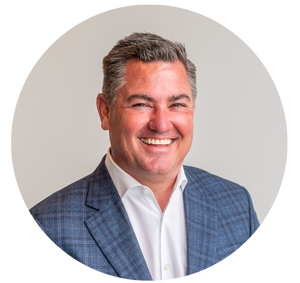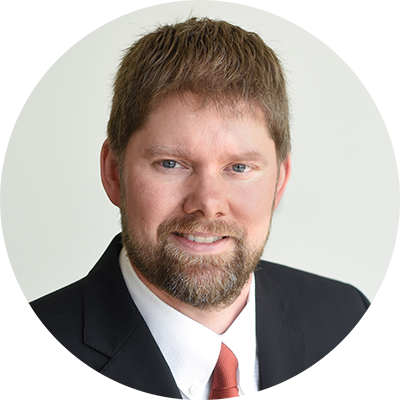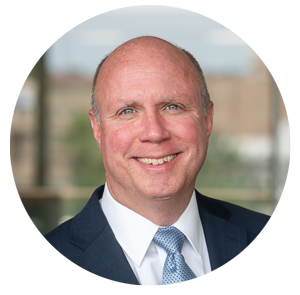The Bottom Line - Banking on Community Investment

Banking On Community Investment
Building more vital neighborhoods and communities through local reinvestment and financial literacy
Financial system fairness and inclusivity are critical goals for all of us in community banking. The security, opportunities and lending services provided by community banks should be available to all who need them, no matter where they live.
This is why we are active and engaged participants in the Kansas City community at Country Club Bank. All Banks are subject to the Community Reinvestment Act (CRA), but for community banks, it’s more than just a regulatory requirement. It’s an opportunity to fulfill our civic responsibility, build new relationships and create long-term economic stability throughout our region. And that’s good for all of us.
Community-First Approach
Meeting the financial needs of all community segments is vital because it promotes more equitable access to credit and capital, which are essential for individual and community growth.
By actively participating in CRA programs, community banks:
- Build Trust. By being present and building a relationship, we build trust with our community members. This trust can lead to stronger customer relationships and increased stability.
- Drive Local Economic Development. Community banks are pivotal in funding small businesses and local infrastructure projects. These efforts boost the local economy and improve all residents' overall quality of life.
- Enhance Financial Inclusion. Community banks help bridge the gap for those otherwise excluded from the financial system. Offering loans and financial services to underserved populations includes providing innovative programs for new deposit account holders, homebuyers, entrepreneurs and small business owners.
The ripple effects of supporting everyone in the community are significant. Here are a few facts about our commitment to Kansas City:
- Country Club Bank’s efforts in lending, investments and contributions support job growth, community services, affordable housing and revitalization in LMI areas.
- Our efforts have impacted Manufacturing, Distribution, Construction, Food Service, Retail Service and Commercial Real Estate businesses.
- The impact of this activity can be seen throughout the metro area, including Kansas City, Grandview, North Kansas City, Lees Summit and Olathe in economically disadvantaged or under-resourced areas.
The math for us is simple: participation aligns with the long-term success of both the bank and the community. Thriving communities create a stronger customer base, benefiting all of us. It’s a sustainable business strategy for individuals, employers and investors when done right.
At Country Club Bank, being a good corporate citizen and engaged community partner is both a responsibility and a privilege. By embracing a community-first approach, we aspire to drive meaningful change, support growth and stimulate success throughout the greater Kansas City area.
To learn more about the CRA and how it can work in your area, contact our lending department or call us at 816-931-4060.

— Brian Hoban, Chief Lending Officer, Country Club Bank, Member FDIC
Economic Insights
Markets rally and another rate cut expected
In recent weeks, U.S. economic indicators have presented a nuanced picture, highlighting positive trends tempered by ongoing cautionary signals.
The unemployment rate increased to 4.1% from 3.7% at the beginning of the year, suggesting a slight easing in the labor market. The latest Job Openings and Labor Turnover Survey (JOLTS) indicates a modest decline in job openings, implying that while hiring demand remains robust, employers exercised caution in expanding their workforces.
Inflation continued to moderate from the beginning of the year, though the headline rate increased slightly to 2.6% in the last month, and core inflation—excluding food and energy—remained steady at 3.3%. Although inflation remains above the Federal Reserve's 2% target, the downward trend favors households and businesses. Strong consumer spending persists, reflecting sustained confidence in personal financial situations despite lingering inflationary pressures.
Even with the latest inflation stability, market sentiment suggests a rate cut remains probable in December (current odds stand at 59%), driven by pressures to sustain economic growth amidst signs of slowing momentum in critical sectors. Another rate cut in December could provide welcome interest rate relief to borrowers and stimulate investment.
Markets have also responded positively to election results, signaling optimism about potential economic policy and governance shifts. Investors expect new lawmakers to balance spending reductions and tax cuts, offering the combined benefit of renewed fiscal discipline with more attractive investment incentives.
Bottom Line: The U.S. economy faces a mixed outlook, with stable core inflation providing a foundation for optimism. At the same time, the likelihood of a rate cut still reflects ongoing concerns about sustaining growth and keeping labor markets healthy. This will keep Fed watchers and markets on the edge of their seats as they anticipate the next move in monetary policy. Overall, cautious optimism persists amid challenges requiring steady monetary policy management.

— Marcus Scott, CFA, CFP®, Chief Investment Officer (CIO) for Country Club Trust Company
CFA® and Chartered Financial Analyst® are registered trademarks owned by CFA Institute.
Certified Financial Planner Board of Standards Inc. (CFP Board) owns the certification marks CFP®, CERTIFIED FINANCIAL PLANNER®, CFP® (with plaque design), and CFP® (with flame design) in the U.S., which it authorizes use of by individuals who successfully complete CFP Board's initial and ongoing certification requirements.
The opinions and views expressed herein are those of the author and do not necessarily reflect those of Country Club Trust Company, a division of Country Club Bank, or any affiliate thereof. Information provided is for illustrative and discussion purposes only; should not be considered a recommendation; and is subject to change. Some information provided above may be obtained from outside sources believed to be reliable, but no representation is made as to its accuracy or completeness. Please note that investments involve risk, and that past performance does not guarantee future results.
Client Success Story
All Fords are created equal; it’s the dealer – and its banking partnerships – that make the difference
For over 65 years, Bob Allen Ford has been a cornerstone of the Kansas City automotive dealership community, blending innovation and excellence with a family-owned tradition.
While the car business has changed significantly over the years, the Bob Allen Ford commitment to relationships, service and continuous improvement has not. The dealership is still guided by its signature motto coined by co-founder Bob Hewlett: “All Fords are created equal. It’s the dealer that makes the difference.”
 Brad Hewlett, Bob’s son and now Dealer Principal, oversees operations at Bob Allen Ford Overland Park and is a partner in the Ottawa location and City Rent A Truck, a truck rental company with locations across the country.
Brad Hewlett, Bob’s son and now Dealer Principal, oversees operations at Bob Allen Ford Overland Park and is a partner in the Ottawa location and City Rent A Truck, a truck rental company with locations across the country.
Hewlett’s tenure at the company began humbly—washing cars and working as a service porter before advancing through nearly every role in the business. Over the last 10 years, Hewlett has led the dealership through numerous expansions, including purchasing another dealership, buying real estate and constructing new facilities.
“Running a business like ours is an incredibly rewarding challenge,” said Hewlett. “We enjoy creating opportunities and a successful work environment for our employees and their families, but it all adds financial complexity and responsibility, and that’s where having a great banking partner like Country Club Bank makes all the difference.”
The relationship goes back decades but grew substantially about eight years ago when the Bank financed Bob Allen Ford’s acquisition of another Ford dealership in Ottawa. Country Club Bank provided loans for real estate, equipment and operating capital, providing a solid foundation for the dealership’s transition and growth.
More recently, Country Club Bank has been instrumental in financing expansion projects near the dealership’s Overland Park location. These include a $5 million, 15,000-square-foot Fleet Service Center designed to handle larger trucks and vans and a state-of-the-art, 14-bay Quick Lane Tire & Auto Center for routine maintenance, repair and car washing. Together, these initiatives represent a total investment of approximately $15 million.
Construction projects often have unforeseen challenges and change orders that can postpone progress or require unexpected out-of-pocket payments. The Bob Allen Ford expansion projects were no exception, as significant change orders required new financing terms.
“The team at Country Club Bank went above and beyond to help us navigate this situation,” Hewlett said. “Rather than requiring immediate payment, they worked with us to spread the costs over many months, giving us the flexibility to preserve operating capital and still meet our financing obligations.”
This willingness to adapt and find creative solutions highlights what Hewlett values most in the partnership: open communication and mutual respect.
“In any great relationship, it’s about give and take. You have to be willing to negotiate and work together, and that’s exactly what we’ve found with Country Club Bank,” Hewlett said.
Bob Allen Ford and Country Club Bank share more than just a business relationship—they share values rooted in family, community and growth. Both organizations are multi-generational, Kansas City-based businesses with deep ties to the area.
 “We’ve known and respected the Thompson family for years,” Hewlett said. “And their team, led by Dan Teahan, has been a pleasure to work with.”
“We’ve known and respected the Thompson family for years,” Hewlett said. “And their team, led by Dan Teahan, has been a pleasure to work with.”
The Bob Allen Ford story continues to evolve. Brad Hewlett’s sons have joined him in the business. Business partner John Wiegers has also had his daughters join the business, positioning the dealership for ongoing growth and expansion. Hewlett said his most important job now is to make sure the values and partnerships created by him and his father and the Wiegers family are transferred to the next generation.
“We’ve built an enduring business by staying focused on what matters—our people, customers and community, and we can never lose sight of that,” Hewlett said. “Country Club Bank has been an important partner not only as a provider of capital but also in their alignment of values, and we’re grateful for their support.”
Associate Spotlight
Investing in the community: A conversation with Joe Mendoza, Community Development Officer at Country Club Bank
We sat down with Joe Mendoza, a community development expert at Country Club Bank, to learn more about his 24 years of experience in banking, how he conducts community outreach on behalf of Country Club Bank, and how he measures success in his role. Here’s what he had to say.
Tell us about your background and role at Country Club Bank.
I focus on connecting with underserved communities across the Kansas City metro area. My responsibilities involve engaging with nonprofit organizations and becoming a familiar face in these communities. The goal is to build relationships, meet people where they are, and make it easier and more comfortable for anyone to approach us as a bank.
I’ve been in banking for 24 years, holding similar roles that combine community awareness with business development. My work fosters relationships and drives outcomes by helping individuals and organizations understand and access banking services.
What does a typical day or week look like for you?
I actively seek opportunities to engage with different community organizations and explore new avenues for the bank to impact. For example, I serve as the board chair for the Hispanic Economic Development Corporation (HEDC), which keeps me deeply connected to the community.
Recently, I attended events focused on affordable housing and youth outreach. Our bank leaders have been incredibly supportive, frequently introducing me to new organizations and projects each week.
What are some key initiatives you’ve been involved in recently?
One significant project is with HEDC, where we recently broke ground on affordable housing townhomes on Southwest Boulevard. We plan to offer down payment assistance to future homeowners. This initiative aligns with the Community Reinvestment Act (CRA), allowing us to support underserved communities by promoting homeownership.
Another key initiative is creating new lending programs to provide access to capital to underserved members of our community.
How do you help bridge financial literacy gaps in the community?
Many employers have Spanish-speaking employees and want to support them but don’t know where to start. I help these businesses by offering financial literacy seminars in Spanish and providing banking solutions tailored to their employees' needs.
Recently, I conducted a series of financial education seminars for a nonprofit. We have several other community partners we are working with to provide financial education to their clients.
What are the critical measurements of success in your role?
Success for us is twofold. First, it’s about growing our customer base across all demographics. This includes projects like affordable housing and additional deposit and lending products to support community needs.
Second, it’s about creating programs that remove barriers to banking. For instance, we are working with our community partners to understand their needs to help guide our product offerings. Anyone looking to open an account or have their questions answered is encouraged to contact us.
What advice would you give business owners or individuals looking to connect with you?
Connections and referrals are always welcome. Many businesses have employees who need bilingual support or financial education, and I’m here to help. Whether it’s a seminar, a consultation or finding the right banking solutions, I’m always happy to connect. The focus is on building trust and creating opportunities for everyone to succeed.
The support I’ve received at Country Club Bank has been excellent. Working for an organization so committed to its customers, employees and the community is a privilege. I look forward to continuing to make a difference here in Kansas City.

— Joe Mendoza, Community Development Officer, Country Club Bank, Member FDIC
Banking on KC Podcast
Thomas Hoenig, former KC Fed President: Navigating economic policy for sustainable growth
In the latest episode of Banking on KC, Kelly Scanlon talks with Thomas Hoenig, Senior Fellow at the Mercatus Center, former President of the Federal Reserve Bank of Kansas City, and former Vice Chair of the FDIC.
Drawing on decades of experience, Hoenig shares his perspectives on pressing economic issues, including the implications of interest rates, the challenges posed by rising national debt, and the Federal Reserve’s role in maintaining economic stability.
Hoenig critically analyzes inflationary pressures, asset bubbles and the interplay between monetary policy and housing affordability. He also discusses the importance of fostering long-term economic growth through thoughtful policymaking and technological advancement.
Take advantage of Hoenig’s insights on adapting and thriving in an ever-changing financial landscape. Listen to the full episode here or scan the transcript to understand better the economic trends impacting businesses nationwide.
New Federal Reporting Requirements
Beneficial Ownership Information (BOI)
Due to federal reporting requirements for Beneficial Ownership Information (BOI) that began on January 1, 2024, many companies in the United States had to start reporting information about their beneficial owners, i.e., the individuals who ultimately own or control the company.
Please check out our reference guide, compliance guide, FAQs and more:
Learn More!